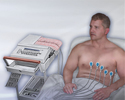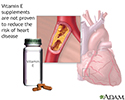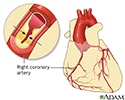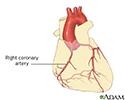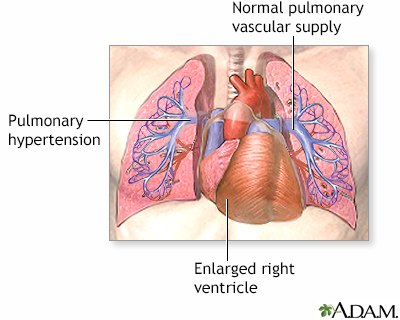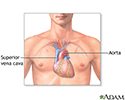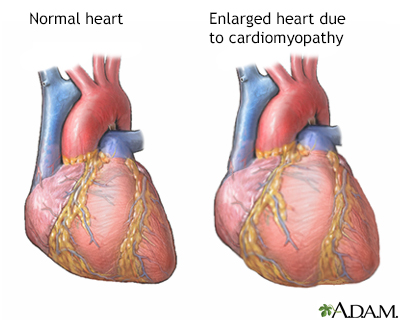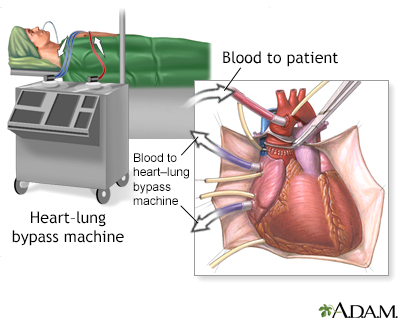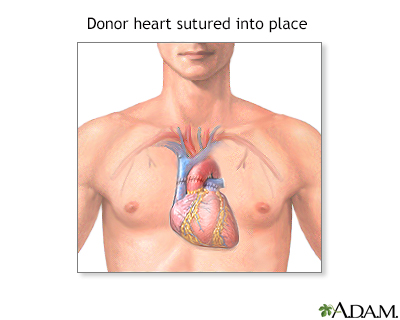Heart disease and diet
Diet - heart disease; CAD - diet; Coronary artery disease - diet; Coronary heart disease - dietA healthy diet is an important factor in reducing your risk for heart disease.
The Basics
Tests for Heart disease
Self Care
- Heart disease and intimacy
- Heart disease - risk factors
- Heart disease and depression
- Living with heart disease and angina
- Warning signs and symptoms of heart disease
- Aspirin and heart disease
- Being active when you have heart disease
- Cardiac rehabilitation
- Diabetes - preventing heart attack and stroke
- Cholesterol testing and results
Talking to your MD
Heart failure - Animation
Heart failure
Animation
Electrocardiogram - Animation
Electrocardiogram
Animation
Lyme disease - Animation
Lyme disease
Animation
Coronary artery disease - Animation
Coronary artery disease
Animation
Cyanotic heart disease
Cyanotic heart disease is a congenital heart defect which results in low oxygen levels in the blood and causes the child's lips, fingers, and toes to look blue (cyanosis).
Cyanotic heart disease
illustration
Vitamin E and heart disease
There is no conclusive evidence that taking vitamin E supplements can reduce your risk of heart disease. In fact, taking vitamin E supplements may actually be harmful.
Vitamin E and heart disease
illustration
Depression and heart disease
The link between heart disease and depression has long been thought of as cause-and-effect. Studies are now showing that depression itself may contribute to heart disease.
Depression and heart disease
illustration
Prevention of heart disease
Heart disease may be prevented by recommended healthy diet, regular exercise and to stop smoking if you are a smoker. Follow your health care provider's recommendations for treatment and prevention of heart disease.
Prevention of heart disease
illustration
Coronary artery disease
The coronary arteries supply blood to the heart muscle itself. Blood supply through these arteries is critical for the heart. Coronary artery disease usually results from the build-up of fatty material and plaque, a condition called atherosclerosis. As the coronary arteries narrow, the flow of blood to the heart can slow or stop, causing chest pain (stable angina), shortness of breath, heart attack, or other symptoms.
Coronary artery disease
illustration
Coronary artery disease
The right coronary artery supplies blood from the aorta to the right side of the heart.
Coronary artery disease
illustration
Heart-lung transplant - series
Presentation
Heart transplant - series
Presentation
Heart failure - Animation
Heart failure
Animation
Electrocardiogram - Animation
Electrocardiogram
Animation
Lyme disease - Animation
Lyme disease
Animation
Coronary artery disease - Animation
Coronary artery disease
Animation
Cyanotic heart disease
Cyanotic heart disease is a congenital heart defect which results in low oxygen levels in the blood and causes the child's lips, fingers, and toes to look blue (cyanosis).
Cyanotic heart disease
illustration
Vitamin E and heart disease
There is no conclusive evidence that taking vitamin E supplements can reduce your risk of heart disease. In fact, taking vitamin E supplements may actually be harmful.
Vitamin E and heart disease
illustration
Depression and heart disease
The link between heart disease and depression has long been thought of as cause-and-effect. Studies are now showing that depression itself may contribute to heart disease.
Depression and heart disease
illustration
Prevention of heart disease
Heart disease may be prevented by recommended healthy diet, regular exercise and to stop smoking if you are a smoker. Follow your health care provider's recommendations for treatment and prevention of heart disease.
Prevention of heart disease
illustration
Coronary artery disease
The coronary arteries supply blood to the heart muscle itself. Blood supply through these arteries is critical for the heart. Coronary artery disease usually results from the build-up of fatty material and plaque, a condition called atherosclerosis. As the coronary arteries narrow, the flow of blood to the heart can slow or stop, causing chest pain (stable angina), shortness of breath, heart attack, or other symptoms.
Coronary artery disease
illustration
Coronary artery disease
The right coronary artery supplies blood from the aorta to the right side of the heart.
Coronary artery disease
illustration
Heart-lung transplant - series
Presentation
Heart transplant - series
Presentation
Heart disease and diet
Diet - heart disease; CAD - diet; Coronary artery disease - diet; Coronary heart disease - dietA healthy diet is an important factor in reducing your risk for heart disease.
The Basics
Tests for Heart disease
Self Care
- Heart disease and intimacy
- Heart disease - risk factors
- Heart disease and depression
- Living with heart disease and angina
- Warning signs and symptoms of heart disease
- Aspirin and heart disease
- Being active when you have heart disease
- Cardiac rehabilitation
- Diabetes - preventing heart attack and stroke
- Cholesterol testing and results
Talking to your MD
Heart disease and diet
Diet - heart disease; CAD - diet; Coronary artery disease - diet; Coronary heart disease - dietA healthy diet is an important factor in reducing your risk for heart disease.
The Basics
Tests for Heart disease
Self Care
- Heart disease and intimacy
- Heart disease - risk factors
- Heart disease and depression
- Living with heart disease and angina
- Warning signs and symptoms of heart disease
- Aspirin and heart disease
- Being active when you have heart disease
- Cardiac rehabilitation
- Diabetes - preventing heart attack and stroke
- Cholesterol testing and results
Talking to your MD
Review Date: 7/24/2024
Reviewed By: Stefania Manetti, RD/N, CDCES, RYT200, My Vita Sana LLC - Nourish and heal through food, San Jose, CA. Review provided by VeriMed Healthcare Network. Also reviewed by David C. Dugdale, MD, Medical Director, Brenda Conaway, Editorial Director, and the A.D.A.M. Editorial team.

